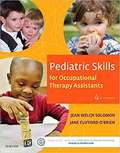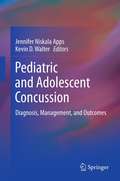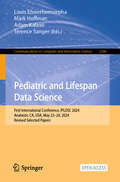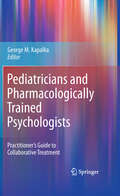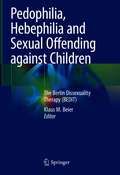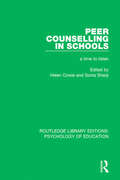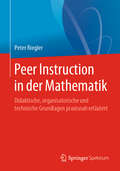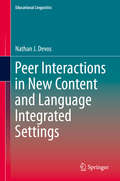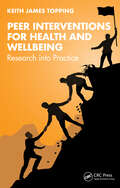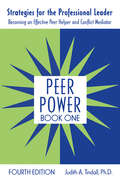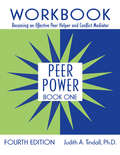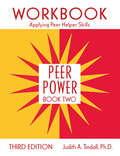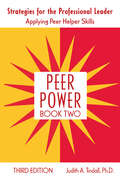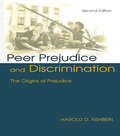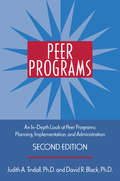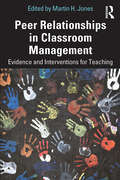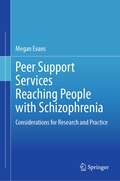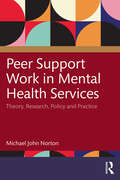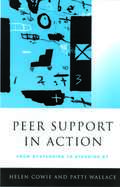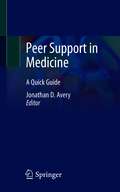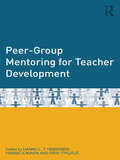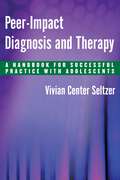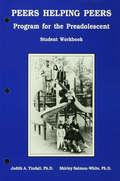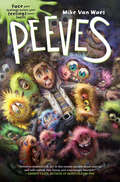- Table View
- List View
Pediatric Skills for Occupational Therapy Assistants
by Jane Clifford O'Brien Jean W. SolomonLearn to provide effective therapy for children and adolescents with Pediatric Skills for Occupational Therapy Assistants, 4th Edition. This market-leading text offers a comprehensive, application-focused guide to pediatric occupational therapy assisting by incorporating the AOTA Practice Framework. The text’s focused and easy-to-use approach to pediatrics covers everything from the scope of practice to in-depth coverage of normal development, pediatric health conditions, and treatment planning. This new edition has also been thoroughly updated and expanded to include new content and chapters on community systems, physical agent modalities, the Model of Human Occupation assessments, childhood obesity, documentation, neurodevelopmental treatment, and concepts of elongation.
Pediatric and Adolescent Concussion
by Jennifer Niskala Apps Kevin D. WalterBetween the growing numbers of children and adolescents playing sports and the increased attention to head injuries by the larger sports community and the general public, pediatric concussions are emerging as a major concern. And as practitioners are seeing more young clients with head injuries, questions arise about age-appropriate assessment, diagnosis, treatment, and return to activity. Pediatric and Adolescent Concussion: Diagnosis, Management, and Outcomes offers evidence-based guidelines where few previously existed. This comprehensive volume clearly explains the effects of traumatic injury on the developing brain in sports- and non-sports-related contexts, and establishes a framework for immediate and long-term management, especially the crucial first 24 hours. Chapters provide a basic grounding in its subject with a history of concussion as a medical entity and a review of definitional and classification issues, take the reader through the steps of a neuropsychological evaluation, pinpoint post-injury issues, and offer strategies for the prevention of further or future injury. Pediatric and Adolescent Concussion: Diagnosis, Management, and Outcomes serves as both educational resource and practical framework for a wide array of professionals, including neuropsychologists, sports medicine physicians, child psychologists and psychiatrists, pediatric and family physicians, athletic trainers, social workers, and educators.
Pediatric and Lifespan Data Science: First International Conference, IPLDSC 2024, Anaheim, CA, USA, May 23–24, 2024, Revised Selected Papers (Communications in Computer and Information Science #2386)
by Mark Hoffman Louis Ehwerhemuepha Adam Kalawi Terence SangerThis open access book will address the unique requirements and technological tools for analysis of data across the lifespan, from childhood through advanced age. Topics such as sepsis, hospital-acquired infections, mental health, health equity, precision medicine, large language models and generative artificial intelligence, computer vision, ethical use of artificial intelligence, and large real-world electronic health record databases will be covered.
Pediatricians and Pharmacologically Trained Psychologists
by George M. KapalkaMany factors affect treatment options for children and adolescents with mental health problems, including age, severity of symptoms, financial and time constraints, and access to qualified professionals. With the limitations of managed care plans and the shrinking pool of pediatric psychiatrists, the trend is toward pediatricians prescribing psychotropic medicines. Pharmacologically trained psychologists can offer valuable assistance to pediatricians caught in this predicament. Tackling fundamental questions of when to treat as well as when and why to refer young patients, Pediatricians and Pharmacologically Trained Psychologists examines commonly occurring pediatric conditions requiring joint treatment; reviews theoretical models of consultation and collaboration; and spotlights professional issues typically arising from these team efforts. With pertinent clarity and detail, this volume offers in-depth discussion in these key areas:Collaborative treatment of mental health conditions, including mood, disruptive, anxiety, and eating disorders. Collaborative treatment of medical conditions, focusing on gastrointestinal disorders and diabetes. Changing clinical procedures in states that have enacted prescriptive authority for psychologists. Expanding roles for pharmacologically trained psychologists practicing in states that have not enacted prescriptive authority for psychologists. Medical psychology in the pediatric hospital. Integrative care in rural settings and on the reservation. The collaborative future: brain marker technology, training paradigms, and more. Pediatricians and Pharmacologically Trained Psychologists is a must-have reference for a broad range of researchers, professionals, and graduate students, including psychologists, pediatricians and other child mental health clinicians as well as nonphysician prescribers, such as nurses, physician assistants, and pharmacists.
Pedophilia, Hebephilia and Sexual Offending against Children: The Berlin Dissexuality Therapy (BEDIT)
by Klaus M. BeierThis book provides extensive information on pedophilia (sexual interest in the prepubescent body age), hebephilia (sexual interest in the early-pubescent body age) and sexual offenses against children, i.e., the various forms of child sexual abuse, including the use of child sexual abuse images, along with the current state of knowledge concerning offender groups. The book makes it clear that pedophilia or hebephilia do not inevitably lead to offenses against children – that there are those who keep their desires in their fantasies and do not act them out on the behavioral level. The World Health Organization classifies pedophilia as a mental disorder. It can be safely assumed that many pedophile men in a given community live their lives, unrecognized and adamant about hiding their sexual drives from society and from themselves, and who are genuinely motivated not to act upon their sexual fantasies. The numbers of exactly this particular group of pedophilically inclined non-offenders can be increased by preventive therapeutic measures. For this purpose, two treatment programs have been developed at the Institute of Sexology and Sexual Medicine at the Charité-Universitätsmedizin Berlin (University Clinic) since the initiation of the Prevention Project Dunkelfeld in 2005 – First, the project involving adult participants (Berlin Dissexuality Therapy: BEDIT) and later, another for adolescents (BEDIT-A), who find themselves attracted to children. Both program manuals are completely integrated into this work, which reflects 15 years of assessment and treatment experience.
Peer Counselling in Schools: A Time to Listen (Routledge Library Editions: Psychology of Education)
by Helen Cowie Sonia SharpOriginally published in 1996, this book is about the role of peer-helping in alleviating interpersonal difficulties among young people in school settings. It is based on real-life experience on the part of the two editors and their contributors in training and developing peer-counselling services in local schools, in order to strengthen policies on bullying, equal opportunities and related personal issues. Young people’s experience of being actively engaged in helping their peers has a positive effect on self-esteem and heightens a sense of responsibility and citizenship in the young people involved. The book seeks to help teachers, educational psychologists, social workers and others working with young people to appreciate the value of peer counselling and to introduce it into their practice.
Peer Instruction in der Mathematik: Didaktische, organisatorische und technische Grundlagen praxisnah erläutert
by Peter RieglerSie möchten Ihre Lehrveranstaltungen aktivierender und wirksamer gestalten? Sie möchten die Verständnisschwierigkeiten Ihrer Studierenden besser erkennen und verstehen? Sie möchten die studentische Beteiligung steigern, zum Nachdenken und Diskutieren anregen? Lernen Sie das Potenzial von Clickerfragen für die akademische Lehre kennen – damit es bei Ihren Studierenden klick macht! In diesem Buch werden die Grundlagen der interaktiv-dialogischen Lehrmethode praxisnah erläutert. Dabei werden auch häufige Fragen zu didaktischen, organisatorischen und technischen Aspekten beantwortet, etwa:Was ist die Grundidee von Peer Instruction?Wie wirksam ist Peer Instruction? Wie überzeuge ich meine Studierenden davon?Welche technischen Voraussetzungen gibt es?Wie stelle ich gute Clickerfragen?Was sollte ich sonst noch beachten?
Peer Interactions in New Content and Language Integrated Settings
by Nathan J. DevosTrade schools, universities, and programs for international students have begun to experiment with Content and Language Integrated Learning (CLIL) as a viable pedagogy for instruction, as the pedagogy of CLIL increasingly gains recognition as a practical form of language and content education in Europe and beyond, and its application in instructional settings becomes more diverse. Corresponding with CLIL's growth, this book focuses on foreign language use during peer interactions in a new CLIL setting. It particularly concentrates on how to conduct research when the focus is on learner interactions. The theoretical background, research methods, and research instruments are explained in a brief and understandable manner. This book is intended for those interested in CLIL and peer interactions and includes a framework and ideas for investigating new CLIL contexts in a practical manner allowing undergraduate and graduate students to conduct their own research in these settings.
Peer Interventions for Health and Wellbeing: Research into Practice
by Keith James ToppingThis book introduces peer interventions (primarily peer education, peer counselling and peer support) for the positive promotion of health and wellbeing as alternative or parallel methods to traditional clinical processes for reaching hard-to-access populations. It is strongly evidence-based, with chapters discussing reviews of the evidence, followed by important papers with key messages for implementation. Furthermore, it describes implementation and evaluation procedures, both in resource-rich environments and in developing countries.Key Features: Bridges the traditional gap between professional clinical advice and the "real world", reaching where professionals cannot go Brings together information about those interventions that are well evidenced Distils information about how to implement interventions for medical professionals and paraprofessionals and charitable agencies and researchers Presents a fine balance between research and implementation, with evidence-driven guidance
Peer Power, Book One: Strategies for the Professional Leader: Becoming an Effective Peer Helper and Conflict Mediator
by Judith A. TindallThe Peer Power Program is a peer training program designed for middle, high school, and higher education students, focusing on 8 core skills: Attending, Empathizing, Summarizing, Questioning, Genuineness, Assertiveness, Confrontation, and Problem Solving. Through a series of exercises, games, and self-awareness techniques, youth and adults involved in the program can gain the basic communication and mediation skills necessary to effectively help their peers. The professional strategies book provides the program leader/facilitator with clear and easy to follow guidelines for implementing the Peer Power Program. After an overview of the peer program philosophy, training structure, and goals, the leader's guide proceeds through the thirteen Modules that are found in the student Workbook. For each exercise in the student Workbook, this leader's guide provides instructions for introducing and implementing the exercise, time and material requirements, description of its purpose and goal, and application assignments. Equipped with the professional strategies book, the program leader (teacher, school counselor, juvenile center officer, mental health professional and human resource professional) can quickly and confidently work through the Peer Power curriculum.
Peer Power, Book One: Workbook: Becoming an Effective Peer Helper and Conflict Mediator
by Judith A. TindallThe Peer Power Program is a peer training program designed for middle, high school, and higher education students, focusing on 8 core skills: Attending, Empathizing, Summarizing, Questioning, Genuineness, Assertiveness, Confrontation, and Problem Solving. Through a series of exercises, games, and self-awareness techniques, youth and adults involved in the program can gain the basic communication and mediation skills necessary to effectively help their peers. Peer Power, Book One, Workbook brings the participating students through first of all understanding their role as a peer helper, understanding themselves based on much of the Myers Briggs Type Indicator and the Asset Building Model. Next, it takes the participant through eight core skills. The last part of the book indicates strategies for implementing peer work into practice. These strategies include limits setting through ethical guidelines, taking care of themselves, conflict resolving skills and putting peer helping into action. The Workbook provides clear instructions for the skills-focused, guided exercises, in a format that is accessible and enjoyable for students in the Peer Power Program.
Peer Power, Book Two: Workbook: Applying Peer Helper Skills (Routledge Series On Family Therapy And Counseling Ser.)
by Judith A. TindallThe Peer Power Program is a peer training program designed for middle, high school, and higher education students, focusing on 8 core skills: Attending, Empathizing, Summarizing, Questioning, Genuineness, Assertiveness, Confrontation, and Problem Solving. Through a series of exercises, games, and self-awareness techniques, youth and adults involved in the program can gain the basic communication and mediation skills necessary to effectively help their peers. Picking up where Book One left off, the Peer Power, Book Two: Workbook brings the participating students through a series of Modules, focusing on how to apply the core skills learned in the first half of the program in real life situations. This volume covers topics such as drugs and alcohol abuse, taking care of you through stress management, leadership training, tutoring, group work, enhancing sexual health, disordered eating, suicide prevention, coping with loss, highway traffic safety, bullying reduction, mentoring, crisis management, character education, problem gambling prevention, and tobacco prevention.
Peer Power: Workbook: Applying Peer Helper Skills
by Judith A. TindallThe Peer Power Program is a peer training program designed for middle, high school, and higher education students, focusing on 8 core skills: Attending, Empathizing, Summarizing, Questioning, Genuineness, Assertiveness, Confrontation, and Problem Solving. Through a series of exercises, games, and self-awareness techniques, youth and adults involved in the program can gain the basic communication and mediation skills necessary to effectively help their peers. The professional strategies book provides the program leader/facilitator with clear and easy to follow guidelines for implementing the Peer Power Program. Picking up where Book One left off, the leader's guide to Book Two proceeds through the same series of Modules that are found in the Book Two Student Workbook. For each exercise in the student Workbook, this leader's guide provides instructions for introducing and implementing the exercise, time and material requirements, description of its purpose and goal, and application assignments. Equipped with the professional strategies book, the program leader (teacher, school counselor, juvenile center officer, mental health professional, and human resource professional) can quickly and confidently work through the Peer Power curriculum.
Peer Prejudice and Discrimination: The Origins of Prejudice
by Harold D. FishbeinThis award-winning book provides an analysis of the genetic/evolutionary, cultural/historical, and developmental aspects of prejudice and discrimination. It emphasizes how certain genetic/evolutionary mechanisms are utilized to both produce and prevent prejudice and discrimination from occurring or to modify these behaviors once established. The goals of the book are to help us understand the limitations of interventions and increase tolerance and acceptance of outsiders. Peer Prejudice and Discrimination, Second Edition is ideal for advanced-level courses on prejudice and/or discrimination taught in departments of psychology, education, and sociology, as well as a valuable addition to any serious scholars personal library.
Peer Programs: An In-Depth Look at Peer Programs: Planning, Implementation, and Administration
by David R. Black Judith A. TindallThe Peer Power Program is a peer training program designed for middle, high school, and higher education students, focusing on 8 core skills: Attending, Empathizing, Summarizing, Questioning, Genuineness, Assertiveness, Confrontation, and Problem Solving. Through a series of exercises, games, and self-awareness techniques, youth and adults involved in the program can gain the basic communication and mediation skills necessary to effectively help their peers. An overview of peer helping, Peer Programs explains the value of and techniques for helping non-professionals learn to help others one-on-one, in small groups and in groups of classroom size. Intended to be of use to those responsible for planning, implementing and/or administering peer programs, this text should also convince those who are not directly involved that peer helping is a worthwhile undertaking – reducing drug and alcohol abuse, dropouts, violence and conflict, HIV and AIDS, pregnancy, stress and negative peer pressure. New features of this edition include: updated rationale for peer programs updated highlights from current evaluation added professionalism- CPPE. Certified Program, Programmatic Standards, Rubric and others CD of forms to customize for all phases of the Peer Program step-by-step guide of new and current programs This book is an indispensable guide for learning important aspects of training peer helpers and as a resource book for a wide range of professional peer helpers, such as: administrators; managers; teachers; counselors; ministers; religious educators; social workers; psychologists; human resource personnel and others in the helping professions.
Peer Relationships in Classroom Management: Evidence and Interventions for Teaching
by Martin H. JonesPeer Relationships in Classroom Management offers pragmatic, empirically validated guidance to teachers in training on issues pertaining to students’ interpersonal relationships. Concepts such as bullying, popularity, and online friendships are ubiquitous in today’s schools, but what kinds of scientific and pedagogical knowledge can support teachers navigating students’ complex lives? Using real-world examples and case studies, this book helps preservice educators to enhance their knowledge of classroom management by focusing on the interpersonal relationships in their schools. Each chapter includes an accessible approach to understanding the social motives in student’s peer interactions inside school, and how to best intervene when these social interactions become detrimental to learning or cause negative interpersonal interactions.
Peer Support Services Reaching People with Schizophrenia: Considerations for Research and Practice
by Megan EvansMany mental health providers are seeking guidance in designing and improving peer support programs for people with mental illnesses. However, the evidence base in this area is limited by lack of consensus on the core components of peer support. This research provides a comprehensive, nuanced view of peer support reaching people with schizophrenia. Results of a realist review of 355 sources and interviews with experts in the field are presented. Realist review is an approach to evidence synthesis that asks, ‘What works, for whom, and in what circumstances?’ Results include a typology of key functions of peer support (e.g., being there, linkage to clinical care and community resources, systems advocacy, ongoing support), documented benefits (e.g., decreased acute care utilization, increased recovery), and implementation recommendations (e.g., critical mass of peer workers, supportive infrastructure, an organizational recovery orientation). The book is intended for program planners, managers, and researchers.
Peer Support Work in Mental Health Services: Theory, Research, Policy and Practice
by Michael John NortonResponding to a growing understanding surrounding the unique knowledge and skill set of individuals with lived experience of mental health conditions, this book responds to a gap in current literature by exploring the role of peer support work through the four realms of theory, research, policy and practice with a particular focus on mental health discourses.Filled with practical case studies and guidance on the most effective approaches to peer support work, chapters support readers in building their knowledge of: The theoretical models of peer work including historical underpinnings, benefits and drawbacks, and the ontological, epistemological basis for lived experience as a knowledge sub-set. The research behind the value of experiential knowledge, models of peer support work, ethical dilemmas and how peer support work relates to traditional mental health discourse. The policy developments in relation to peer support work. Peer support work in practice, including work with families, support work specialisms and current guidance on best practice. A must-read read for those working within mental health services, this book provides a comprehensive guide to peer support work for mental health professionals, programme managers, peer support workers and service users.
Peer Support in Action: From Bystanding to Standing By
by Helen Cowie Patti Wallace`It would be of use to adults and teachers who are starting to research peer support and the logistics of adopting such a scheme in their school. It would also be of use to saff who are currently operating a peer support scheme. I personally will use this book and keep a copy in the counselling service library, recommending it to counsellors/trainers and teachers interested or already facilitating peer support in their schools′ - British Journal of Guidance and Counselling `It is to read, comprehensive in its structure and advice and through examples of first-hand experiences, makes the reader feel enthusiastic about trying out different ideas…. An excellent handbook for the manager of a peer support system for any organization′ - Anne Woodhouse, Clinical Child Psychology and Psychiatry Peer support systems are increasingly being used in schools and other youth settings to tackle problems such as bullying, rejection, social exclusion, sexual identity, self-esteem and loneliness. Peer Support in Action is a practical guide which gives adults who work with children and young people the knowledge, understanding and practical tools to provide effective and appropriate systems of peer support. Helen Cowie and Patti Wallace combine insights drawn from practice with up-to-date research findings, to give a sound basis for peer-based interventions. They encourage readers to build on the potential for offering help which many young people have and give practical guidance on how to train, guide and supervise them in supporting their peers. Peer Support in Action is for teachers, educational psychologists, social workers, education welfare officers, counsellors and counselling psychologists and all professionals involved in the pastoral care and guidance of children and young people.
Peer Support in Medicine: A Quick Guide
by Jonathan D. AveryThe book serves as a guide for all clinicians seeking to improve healthcare outcomes by implementing peer support in the treatment and management of medical and mental health conditions. The book begins with a chapter that describes the importance of peers and how peers are increasingly being utilized to improve medical outcomes. Each chapter opens with an introductory section, include tables and figures, and ends with a summary section for quick reference. Written by experts in the field, this resource covers the clinical implications for peer support in substance misuse, chronic medical conditions, in special populations, and mental illness generally. Each chapter is designed specifically to be accessible for a broad clinical audience of experts and non-experts across medical specialties. Peer Support in Medicine is an excellent resource for all clinicians seeking to improve healthcare outcomes using the gains made by the peer support model, including psychiatrists, psychologists, healthcare researchers, and medical students across specialties, nurses, social workers, and all others.
Peer-Group Mentoring for Teacher Development
by Päivi Tynjälä Hannu L.T. Heikkinen Hannu JokinenSupporting new teachers is a common challenge globally and the European Commission has recently emphasised the need to promote a lifelong continuum of teachers professional development by building bridges between pre-service and in-service teacher education.Peer-Group Mentoring for Teacher Development introduces and contextualises for an internati
Peer-Impact Diagnosis and Therapy: A Handbook for Successful Practice with Adolescents
by Vivian Center SeltzerAdolescents are infamous for their rebellious behavior. Indeed,much of the focus of therapy and clinical intervention with troubled adolescents focuses on their presumed need to rebel against their parents as they define their own identities. Yet psychologist Vivian Center Seltzer argues that approaching work with adolescent clients with this presumption in mind is likely to miss the roots of their problem behavior.Rather than acting out against parental authority, adolescents in need of clinical help are most often dealing with their disappointing comparisons with their peers—the most relevant others to them during this period of their development. Seltzer explains that it is countless interactions with their peers, at school and elsewhere outside of the home, that are the primary mode of psychological and social development for adolescents. Practitioners must recognize this crucial influence, and perhaps forgo traditional approaches, in order to better work with their adolescent clients.Peer-Impact Diagnosis and Therapy is a practical professional guide for how to approach and aid troubled teens by accessing the wealth of insight to be gained from understanding the influence of peer interactions on development and on behavior. Full of diagnostic categories and protocols for use with all types of adolescents, as well as guidance, tips, case studies, and offering a targeted model for adolescent group therapy, Seltzer provides professionals with all the tools they need to assist teens on their road to adulthood.
Peer-assisted Learning: A Practical Guide For Teachers
by Keith Topping Stewart EhlyPeer Assisted Learning (PAL) involves children in school consciously assisting others to learn, and in so doing learning more effectively themselves. It encompasses peer tutoring, peer modeling, peer education, peer counseling, peer monitoring, and peer assessment, which are differentiated from other more general "co-operative learning" methods. PAL is not diluted or surrogate "teaching"; it complements and supplements (but never replaces) professional teaching--capitalizing on the unique qualities and richness of peer interaction and helping students become empowered democratically to take more responsibility for their own learning. In this book, PAL is presented as a set of dynamic, robust, effective, and flexible approaches to teaching and learning, which can be used in a range of different settings. The chapters provide descriptions of good practice blended with research findings on effectiveness. They describe procedures that can be applied to all areas of the school curriculum, and can be used with learners of all levels of ability, including gifted students, students with disabilities, and second-language learners. Among the distinguished contributors, many are from North America, while others are from Europe and Australia. The applicability of the methods they present is worldwide. Peer-Assisted Learning is designed to be accessible and useful to teachers and to those who employ, train, support, consult with, and evaluate them. Many chapters will be helpful to teachers aiming to replicate in their own school environments the cost-effective procedures described. A practical resources guide is included. This volume will also be of interest to faculty and researchers in the fields of education and psychology, to community educators who want to learn about the implications of Peer Assisted Learning beyond school contexts, and to employers and others involved in post-school training.
Peers Helping Peers: Programs For The Preadolescent
by Judith A. Tindall Shirley SalmonFirst published in 1990. Routledge is an imprint of Taylor & Francis, an informa company.
Peeves
by Mike Van Waes“Gremlins meets Inside Out in this sneaky parable about courage and self-control. Fun, funny, and surprisingly heartfelt."—Ernest Cline, author of Ready Player OneSteven (Slim) Pickings is on the edge of a breakdown—but then, it always feels like Slim is teetering on the edge of something. The difference this time is that something’s caused Slim’s worries to come alive!He’s set loose a bunch of annoying, pesky, outrageously contagious creatures—and they’re infecting everyone they meet and massing to take over the town! Slim’s problems began when he and his sister, Lucy, visited their dad's work and Slim was hit in in the face with an experimental medicine, a previously not-yet-human-tested anti-anxiety spray called Personal Vexation Zoners, PVZ. No one knew the side effects before, but certainly none of the experts imagined that the spray would cause anyone infected to literally sneeze out their biggest peeves.Now Slim and the rest of the town are trailed by the things that annoy them most. Noisy Peeve, Lazy Peeve, Asking Peeve—they all stick with Slim at all times and left untreated, they’re quickly getting worse and way, way more destructive.To stop them, Slim will have to do more than just team up with his family and friends—he’ll have to face his fears, literallyDebut author award-winning screenwriter Mike Van Waes brings original intelligence and wit to a magical coming-of-age story in Peeves, where you have to face your feelings before your feelings have faces.
